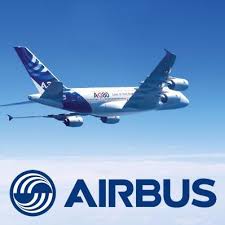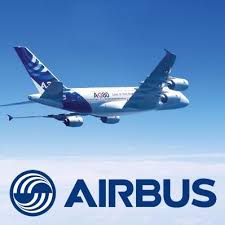
The European planemaker Airbus’s group chief executive said that the A380 program would not massively be driven into the red by Airbus's decision to cut production of the world's biggest passenger jet.
Airbus hopes to return to higher levels of output in the years ahead and the company remains optimistic about the long-term prospects of the double-decker, 544-seat A380, Tom Enders added.
"I hope that this is only a year or two and then we can raise production rates again," he told reporters at the Farnborough Airshow.
Forced by weak demands, Airbus cut its target for A380 deliveries to 12 a year from 2018, from 27 in 2015 and well below its current break-even point a day before Enders’s speech.
One of Europe's biggest and most expensive industrial projects was dealt a blow by the reduction.
Driven by rising air travel and demand for new fuel-efficient planes, Airbus and U.S. rival Boeing have enjoyed years of booming sales.
However analysts are worried some of the industry's record order backlog could be deferred or canceled and sales have dried up due to risks to the global economy, from slowing growth in China to Britain's decision to leave the European Union.
Including deals that confirmed preliminary agreements, Airbus and Boeing have announced combined business worth a little more than $50 billion so far at the Farnborough Airshow, the industry's showcase event. At last year's sister event in Paris, the business was more than double the amount announced this year.
Even before research and development costs, of 250 million euros in 2018, 300 million in 2019 and 350 million in 2020, Jefferies analysts said they had already been expecting the A380 to make a trading loss.
However with new engines, to counter the new version of Boeing's most profitable widebody jet, the 777, being developed by the U.S. company, the cut in production could be a prelude to a revamped A380neo, they added.
At lower rates of production Airbus would strive to break-even on the A380, Enders said.
"How far we can bring it down, we will have to see. I do not expect to be massively in the red," he said.
$432.6 million is the list price for each of the A380s but ultimately they sell for a significantly lower amount after discounts. Improvements in the range and efficiency of smaller two-engined models, which can be easier to fill have hard hit the sales of large four-engine airliners such as the A380.
After progressively shelving its long-standing order for A380s, Richard Branson's Virgin Atlantic, opted for 12 of Airbus's A350-1000 twin-engined jets on Monday. Branson has been one of the mammoth plane's earliest advocates and his decision highlighted the trend being talked about for four engine huge planes.
Airbus was likely to take a fresh charge in first-half results later this month for the latest problems involving its A400M military transporter, the company’s finance chief Harald Wilhelm said on Wednesday.
Deliveries of the already delayed military plane have been disrupted and costs driven up by the problems that the company partially blames on the gearbox of the aircraft's large turboprop engines.
(Source:www.reuters.com)
Airbus hopes to return to higher levels of output in the years ahead and the company remains optimistic about the long-term prospects of the double-decker, 544-seat A380, Tom Enders added.
"I hope that this is only a year or two and then we can raise production rates again," he told reporters at the Farnborough Airshow.
Forced by weak demands, Airbus cut its target for A380 deliveries to 12 a year from 2018, from 27 in 2015 and well below its current break-even point a day before Enders’s speech.
One of Europe's biggest and most expensive industrial projects was dealt a blow by the reduction.
Driven by rising air travel and demand for new fuel-efficient planes, Airbus and U.S. rival Boeing have enjoyed years of booming sales.
However analysts are worried some of the industry's record order backlog could be deferred or canceled and sales have dried up due to risks to the global economy, from slowing growth in China to Britain's decision to leave the European Union.
Including deals that confirmed preliminary agreements, Airbus and Boeing have announced combined business worth a little more than $50 billion so far at the Farnborough Airshow, the industry's showcase event. At last year's sister event in Paris, the business was more than double the amount announced this year.
Even before research and development costs, of 250 million euros in 2018, 300 million in 2019 and 350 million in 2020, Jefferies analysts said they had already been expecting the A380 to make a trading loss.
However with new engines, to counter the new version of Boeing's most profitable widebody jet, the 777, being developed by the U.S. company, the cut in production could be a prelude to a revamped A380neo, they added.
At lower rates of production Airbus would strive to break-even on the A380, Enders said.
"How far we can bring it down, we will have to see. I do not expect to be massively in the red," he said.
$432.6 million is the list price for each of the A380s but ultimately they sell for a significantly lower amount after discounts. Improvements in the range and efficiency of smaller two-engined models, which can be easier to fill have hard hit the sales of large four-engine airliners such as the A380.
After progressively shelving its long-standing order for A380s, Richard Branson's Virgin Atlantic, opted for 12 of Airbus's A350-1000 twin-engined jets on Monday. Branson has been one of the mammoth plane's earliest advocates and his decision highlighted the trend being talked about for four engine huge planes.
Airbus was likely to take a fresh charge in first-half results later this month for the latest problems involving its A400M military transporter, the company’s finance chief Harald Wilhelm said on Wednesday.
Deliveries of the already delayed military plane have been disrupted and costs driven up by the problems that the company partially blames on the gearbox of the aircraft's large turboprop engines.
(Source:www.reuters.com)





